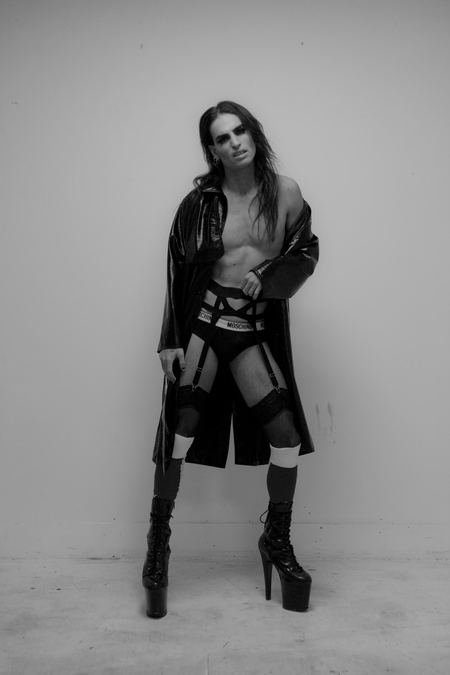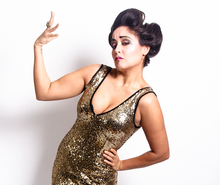Queering Fringe
Interview: Victoria Falconer and Bj McNeill speak to Fest about queer visibility at the Fringe

Festivals represent the pinnacle of the arts in many more ways than attracting big names. Most importantly, festivals provide space that represents the underrepresented.
This is well understood by those who are aware of the festival’s namesake, but for those who are not, the longstanding affinity between established and emerging artists might seem something of an enigma. The truth is that Fringe Festival has always been a platform for people who fall outside the box.
Victoria Falconer and Bj McNeill, two LGBTQI+ performers at this year’s festival, know the importance of queer representation and safe spaces. Their respective shows seek to break the binary. “The whole point of Fringe is that it was started by the outsiders,” says Falconer.
The original Fringe in Edinburgh was created by several groups of performers marginalised from the International Festival which had been set up as an invitation-only and exclusive affair. On the 'fringe' of the the Festival, free of its constraints, the Fringe blossomed over the next few years, especially with late night, and sometimes risqué, revues.
In recent years, as conversations about LGBTQI+ rights come to the forefront of the mainstream media, visibility and diversified representations are more important than ever.
Falconer, who makes up one third of feminist comedy trio Fringe Wives Club, says she did not initially consider her personal story important enough to tell. That changed when she started receiving positive feedback from audience members while performing as part of EastEnd Cabaret.
“I would have people after [the show], particularly half-Asian women, saying they had never seen anybody do what I was doing on stage… especially talking about raunchy, sexually open and sexually positive things. I felt like I understood that because even just the visibility of having people look like me was very limited when I was growing up,” Falconer says.
She devised her 2018 solo show, Oxymoron, after she realised there were a lot of people around her who needed a story told that represented their own, perhaps more than she did.

Detailing her experiences as a mixed-race bisexual woman, Falconer manages to address some serious issues through light-hearted musical parody, topped with musical finesse. Her tongue-in-cheek attitude drives the narrative, enhancing the underlying wider issues rather than minimising them.
“People are brought on this journey and by the time they realise what’s happening, they’re more affected emotionally [because] they’re not analysing what’s happening all the way through, and I think the feeling of it comes across and it hits them harder,” Falconer says.
“And it means we get them to talk about the issues… everybody can start to talk about it in more of an accessible and open, and very inclusive kind of way.”
Another artist who is similarly passionate about the importance of instigating conversation through art is Sydney-born, London-based actor, Bj McNeill. Adelaide Fringe Festival is the second destination for their new theatre art piece FLAWED____like a b_y, touring Australia for the first time. The show addresses homophobia and toxic masculinity within Australian society, which McNeill says is “devised around autobiographical text.”
Although McNeill admits that working on the show back in Australia does bring up a lot of emotionality – particularly due to the show’s content being specifically based on the discrimination they faced growing up in Sydney – they describe the performance itself as a “cleansing process”. It is this righteous, personal need that presents as McNeill’s driver to be proudly seen and heard.
"My identity is really important to me… and it’s something that I feel I need to express in a particular way," McNeill says. "I think a lot of that comes from being repressed and not being able to explore my identity or expose it because of certain factors in society such as homophobia, misogyny, and overt masculinity." McNeill addresses the sincere importance to express gender and sexuality in a safe and accepting environment, as it is important for all LGBTQI+ people. It makes a space like Fringe Festival – with its ability to platform LGBTQI+ performers to tell their respective stories to the masses – a critical instrument in representing marginalised communities and elevating LGBTQI+ performers.
"I think a lot of heterosexual people don’t realise that we’ve been walking into rooms for as long as we can remember trying to work out whether they’re a safe space or not for us… That’s something that hasn’t gone away as much as we may have progressed with social politics the LGBT movement. It’s still there – and that’s an issue," McNeill says.
Both inclusivity and acceptance is as important to the people behind the Fringe as it is for the performers within it. The Fringe's CEO, Heather Croall, commented on maintaining the festival’s original open access policy. "We see diversity as central to the Fringe," Croall states. "It's at the core of everything we do, as is inclusivity. Communities who feel like they're outsiders in the mainstream often find their home and their family here at the Fringe."
The Fringe was created to provide a haven for those ousted by society, elevating them with the means to be visible and proud. It is no wonder that so many LGBTQI+ people find their home here.
FLAWED___like a b_y, Gluttony – Masonic Owl Room, 5-10 Mar, 6pm.
 Floods of Fire with Electric Fields & the ASO
Floods of Fire with Electric Fields & the ASO
 Review: Time Machine
Review: Time Machine
 Review: Antigone in the Amazon
Review: Antigone in the Amazon
 Review: I Hide in Bathrooms
Review: I Hide in Bathrooms